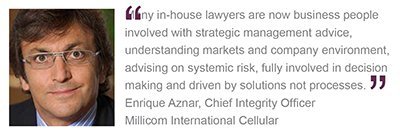In-house lawyers must treat the business as their own
One of the top in-house lawyer’s organisations in the world met in Barcelona offering European lawyers the opportunity to evaluate the current challenges facing in-house lawyers
The Association of Corporate Counsel (ACC) Europe, recently brought together in Barcelona a high profile group of around 300 in-house lawyers to discuss the new role of the internal counsel around the world. Multinationals and global businesses were leading the sessions, presenting a businesslike approach in providing legal services.
In-house lawyers talked mostly about compliance and in many cases emphasized the risk that is causing the increasing use of technology in companies.
Flexible role
The role of the in-house lawyer does not correspond anymore to a blocker or barrier to business development, but as Enrique Aznar, Chief Integrity Officer from Millicom International Cellular, said: “Many in-house lawyers are now business people involved with strategic management advice, understanding markets and company environment, advising on systemic risk, fully involved in decision making and driven by solutions not processes.” The commitment of in-house lawyers in the business has to be of the highest level, and flexibility is key to meet company needs. Christophe François from AVG Technologies commented that a practical approach to the profession is required but lawyers have to care about the business as if it was theirs.
Both sides of the coin
Some of those attending the conference were former in-house lawyers that had moved into private practice, and they said that they now have more capacity to respond to the real needs of the current internal lawyers as they “had been there before”. They all seemed to agree that the level of commitment and responsibility in-house is increasing and in some cases going beyond their capabilities, and that companies are not motivating or managing to retain their internal lawyers as they are offering salaries that are with not very competitive. As companies are restricting their spend, law firms are finding an opportunity to recruit experienced in-house lawyers that are able to understand strategic sectors such as technology, energy or telecommunications.
Certainty on fees
Firms are developing niche practices and trying to offer flexible fee arrangements to meet their clients’ requirements. This is a major trend amongst midsize specialists firms, such as Ecija a specialist IT firm that was present at the conference and whose Barcelona Managing Partner Gabriel Nadal, mentioned that “it is crucial to establish close relationships with clients and when necessary to agree a convenient fee arrangement that allows an ongoing relationship with no “surprises” at the end, in particular with foreign clients that require more support”. Others say that clients are developing more strict requirements from their law firm panels, including the use of bidding processes to continue working with key clients internationally. These processes are becoming more and more competitive with clients undertaking serious due diligence on their law firms, including requesting that compliance and ethical programmes in place.
The risks of integrated technology
The majority of cross-border operations use technology as a tool for communication or with which to trade, in particular the participants at the conference talked about the increasing use of cloud computing for data sharing, which has an interesting effect on privacy and data protection. “Companies are looking for cost effective ways when going cloud but sometimes cheap is expensive in the long-run”, says Javier Samaniego, partner at Bird & Bird.
Cybercrime is another area where companies are paying more attention, considering the increasing vulnerability that their businesses face and the dependency they have on their data. The EU has already identified the risk and has set up a special division to investigate and sanction cybercrime. “The balance between business development and gathering data and the need for an adequate protection of personal data is crucial,” said Manuel Garcia Sanchez, Head of Service International Affairs, from the Agencia Española de Proteccion de Datos.
 Alternative ways to manage conflict
Alternative ways to manage conflict
Conflict management was also a key topic at the ACC. Mediation and negotiation were presented and discussed by important groups of in-house lawyers and litigations specialists. Amongst the audience there we lawyers questioning the different ADR methods, wanting to learn more about the processes and discussing the formality of the litigation process of gathering and reading all the background information before engaging in any resolution method. Ute Joas Quinn, Associate General Counsel from Hess Services UK and a panelist from IMI insisted in taking disputes as an open negotiation facilitated by a third neutral party, and to use all the alternative structures that ADR offers (i.e Med-Arb, Arb-Med, etc) depending on the parties, to motivate them to reach an agreement and continue with business instead of blocking it.
The opportunity that meetings like the ACC offers to company lawyers is not only to benchmark practices from the top companies in the world but also to evaluate the ways to manage their legal department and check whether they are well placed for the upcoming and future challenges ahead.












